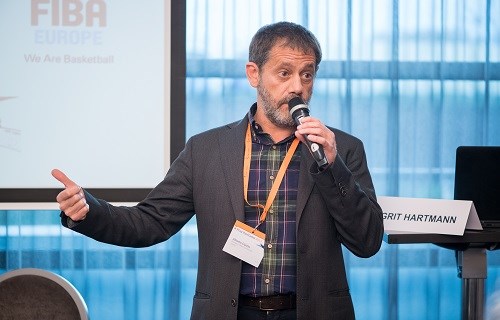Culture Matters: Sports governance around the globe

Alberto Sampedro speaking at Play the Game 2017.
Photo: Thomas Søndergaard/Play the Game.
05.02.2018
By Aderonke Ogunleye-BelloArjo Klamer, Professor at the Erasmus University Rotterdam and Dolf Seegar, Lawyer at CMS Law-Tax discussed the need for governance in global sports at a session during Play the Game 2017. Quoting article 165 of the Treaty on the Functioning of the European Union (TFEU): "the EU shall contribute to the promotion of European sporting issues, while taking account of the specific nature of sport, its structures based on voluntary activity and its social and educational function”, Klamer explained how the TFEU explicitly recognises the social logical work in the world of sports.
As markets for sports grow, the need for government interference increases, noted. This presents a dilemma; on the one hand, sports federations claim political autonomy – on the other hand, governments want to interfere if the markets are getting too large in order to ensure a well-functioning sports environment.
Governments may interfere in sports with respect to rules with an economic impact but not in relation to rules with a purely sporting interest, explained the two presenters explained. This could cause potential disagreements between governments and sport federations. However, although governments may need to interfere with respect to economic issues, it is still possible for the federations to maintain autonomy with respect to sporting issues.
The need for legitimacy in global sports governance
Global governance institutions, such as the International Olympics Committee (IOC) and the World Anti-doping Agency (WADA), for instance, plays a constitutive role in the provision of legal legitimacy. Through coordination of joint actions, the IOC and WADA may realize outcomes that are mutually beneficial to both organisations and to sports in general, according to Albert Carrio Sampedro, Lecturer in Law and Legal theory at the Pompeu Fabra University. Sampedro further emphasised the legitimacy that is needed in sports governance and the importance of coordinating efforts to fight off global doping threats.
On a global scale, individual sports are intrinsically linked by competitions among clubs, nations, cities, continents, etc. However, global competitions need global institutions to fight off global threats in sports, Sampedro asserted.
Instead of focussing on sport itself, doping scandals and stories of corruption fill the headlines of newspapers around the world. This situation needs to be addressed for the benefit of sport itself.
Why legitimacy matters
Legitimacy could see to the end of compliance and at the same time strengthening efficiency. If global governing institutions are legitimate and provide moral independent reasons to comply it may be possible to deal with a series of issues facing global sports, Sampedro noted.
Global institutions must fight against corruption, take charge when efficiency fails by seeking collaboration, and reinforce transparency and standards of accountability. In the situation of a complex standard of legitimacy, global sports governance institutions must find legitimacy through a global conversation, Albert Carrio Sampedro stressed.
With the right to rule and ask for compliance, the institutions must lead by example, he concluded.





